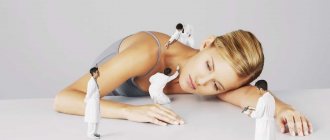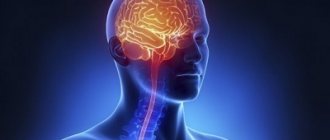Poor circulation
If the blood does not function well as an oxygen carrier, a person may experience dizziness
Blood circulation is a characteristic that indicates how well blood circulates throughout the body. Blood carries oxygen, so if it doesn't move through the body correctly, the brain may not receive enough oxygen.
If there is a lack of oxygen in the brain, sudden movements, such as lifting the head up, down, or bending over, can cause dizziness.
A person should consult a doctor if they experience dizziness due to poor circulation, as it may be a sign of the following conditions:
- heart attack;
- arrhythmias;
- chronic heart failure.
Dizziness during pregnancy
One of the first signs that may indicate the development of pregnancy is dizziness. It may occur independently or be accompanied by nausea. If these symptoms do not affect the pregnant woman’s condition and occur periodically, then she does not require treatment.
About why you may feel dizzy at different stages of pregnancy.
For a detailed analysis of the reasons, watch the video:
If a woman is constantly dizzy, this may indicate some problems in her body:
- Reduced level of hemoglobin in the blood. To increase it, the doctor will recommend a special diet or prescribe medications containing iron.
- Diet or poor nutrition. If a pregnant woman, for fear of gaining extra pounds, limits herself to food or eats irrationally, then her blood glucose level may drop sharply, which causes dizziness. In such cases, it is enough to simply adjust your diet.
- Spinal diseases.
In each of these cases, the head begins to feel dizzy when tilting down, as blood circulation increases and a disruption in its regulation may occur. However, a pregnant woman should remember that no matter how harmless the cause of dizziness may seem, she should definitely tell her doctor about it.
Low blood sugar
Low blood sugar, or hypoglycemia, can also cause dizziness because the disorder causes brain cells to malfunction. Low blood sugar may be a result of not eating enough or not eating for several hours.
Diabetics are especially prone to dizziness, which occurs due to low blood sugar levels. Changes in medications taken or bending over immediately after taking insulin also increase the chances of dizziness.
Harmless causes of disorder
A person may not suffer from the disease, but an unpleasant symptom appears. There may be several reasons for this:
- Rapid movement of a person in space (riding on carousels, swings).
- Unbalanced diet, lack of vitamins in food. The brain does not receive enough glucose, which is so necessary for its normal functioning.
- During times of excitement, fear, stress, a special hormone, adrenaline, is produced. As a result, the blood vessels narrow for some time, the pressure rises and oxygen stops flowing to the brain.
- Dizziness may occur while taking certain medications, especially anti-allergy medications, as well as sleeping pills and antibiotics.
- Poisoning with food, medicine or drinks leads to a feeling of dizziness in addition to nausea, vomiting and headache.
- Chronic fatigue and lack of sleep.
- Strong physical activity.
A condition where you feel dizzy during normal life activities can occur in a stuffy, small room or during the period of recovery of the body after a cold.
Any symptom of a cold (runny nose, cough) cannot be ignored. Complications can cause dizziness, disturbances in the functioning of the vestibular apparatus and other consequences.
Low blood pressure
If you have low blood pressure, sudden changes in head position can cause dizziness, especially when you stand up or bend over. Low blood pressure usually indicates good health, but certain symptoms may also be associated with it. Dizziness usually results from the fact that with a sudden change in body position, difficulties arise in quickly reaching the brain with blood.
When a person with low blood pressure bends or stands, they may experience the following symptoms:
- dizziness;
- dark spots before the eyes;
- weakness;
- cloudiness;
- fainting;
- imbalance.
Treatment and prevention
A clear daily routine, with a constant alternation of work and rest, can help in the fight against dizziness. Daily walks in the fresh air and an active lifestyle combined with daily exercise and physical activity are required. However, you should not overdo it here. The body should be kept in good shape, but not overloaded.
It is necessary to provide the body with vitamins, amino acids and minerals in sufficient quantities. Therefore, it is recommended to make your diet more varied and balanced.
Smoking and excessive alcohol consumption negatively affects the functioning of all organs. In this case, the symptoms only intensify. It is strongly recommended to observe moderation in everything. So, people who have low hemoglobin will benefit from red wine in small quantities.
Healthy and adequate sleep of at least 8 hours is necessary to prevent dizziness. All this refers to preventive measures and is recommended to all people without exception. Following these tips will help reduce the frequency of attacks or, in some cases, eliminate them completely.
However, treatment should only be prescribed by a doctor. The first thing you should do is visit a therapist. He will prescribe a suitable course of treatment or refer you to another specialist. If you feel dizzy when changing body position and this is accompanied by ear pain or problems with the vestibular system, you should consult an otolaryngologist.
If there is poor circulation and pain in the cervical spine, you should visit a neurologist. At an appointment with a doctor, it is best to describe in detail the frequency and nature of the sensations that arise when changing the position of the head. This will help him make a diagnosis.
Medicines
Depending on the underlying cause of dizziness, medications with antihistamine, sedative and sedative effects may be prescribed. Medicines are sometimes used to treat attacks of vomiting and nausea. In any case, self-medication is excluded.
Dehydration
Staying hydrated can prevent dizziness
Dehydration results from the fact that an insufficient amount of fluid enters the human body.
The following factors can lead to dehydration:
- a long period of time without drinking water;
- intense physical activity;
- hot environment;
- diseases;
- vomit;
- diarrhea.
All of the above sometimes causes a person to feel dizzy when tilting their head. This happens because too little fluid in the body makes it difficult for the brain to function properly.
Diseases accompanied by dizziness
If the patient not only becomes dizzy when bending down, but also develops additional characteristic symptoms, the doctor suspects a number of diseases. So, in combination with vertigo, the following may appear:
- sweating;
- pale skin;
- tachycardia, pressure surges;
- fever and increased body temperature;
- nausea and vomiting.
If several of the above symptoms are present, a specialist may suspect the patient:
- Meniere's disease: well recognized by the characteristic symptoms of a feeling of congestion, tinnitus, and hearing loss. After each attack of dizziness, hearing loss progresses;
- otitis media and other ear diseases are characterized by pain, partial hearing loss, and a feeling of stuffiness;
- during poisoning and intoxication of the body, when the head is tilted forward, the patient often experiences a severe migraine;
- in case of diseases of the ear membrane, a large amount of fluid accumulates in the cavity, as a result of which hearing decreases;
- disruptions in the functioning of the cervical spine. In the vertebrae of this section there are paired vertebral arteries, which supply blood to the brain tissue, in particular, the centers of balance: the posterior part of the brain and the cerebellum. If a tilted or rotated cervical spine causes constriction of the artery, little oxygen will flow to the balance centers, which will provoke starvation: this is why dizziness occurs;
- Possible problems with the cervical spine include: tumor formations, osteochondrosis, hernia, spondylosis and spondylolisthesis, atherosclerotic plaques that cause narrowing of the lumen of the vessel;
- tumor formations in the brain;
- stroke;
- post-traumatic dizziness (temporal bone fracture, formation of perilymphatic fistulas, concussion affecting the labyrinthine area);
- Vertigo can also be caused by taking ototoxic medications, or simply be a side effect of taking a particular medication. This is usually indicated in the list of side effects in the annotation for the drug.
Inner ear problems
The inner ear provides balance to humans. Conditions affecting this organ may cause dizziness
Balance in humans is controlled in the inner ear. Infections or injuries to the ears can cause a person to experience dizziness when standing or tilting their head.
Common infections often lead to these symptoms, but sometimes problems with the inner ear can cause a condition called benign paroxysmal positional vertigo (BPPV).
BPPV develops when calcium particles travel from one part of the ear to another.
This may lead to dizziness.
Diagnostics
To determine the cause of presyncope, a medical history is first collected. It is necessary to answer the doctor questions about the nature of the sensations and the time of their appearance:
- how exactly the head is spinning - surrounding objects are moving or there is a feeling of lightheadedness with darkening in the eyes, instability of the floor, which seems to be falling through;
- how long does the sensation last - minutes, hours, days;
- when dizziness appears - when changing body position, walking, standing up, regardless of movements;
- how severe is the dizziness?
- are there any additional symptoms – headache, nausea;
- the feeling goes away on its own or only after taking medications or taking a lying position.
We invite you to familiarize yourself with Varicose veins and potency: is there a connection?
Additional tests may be prescribed for diagnosis:
- Holter monitoring to determine pressure surges during the day and relate them to dizziness and headaches;
- duplex scanning of the vessels of the head and neck to assess their patency and the absence of compression;
- CT and MRI of the brain to detect tumors.
Other states
Other conditions that may cause occasional dizziness include:
- migraine;
- Parkinson's disease;
- Lyme disease;
- depression;
- irritability;
- dementia (dementia);
- changes in hormonal levels during menstruation or pregnancy;
- peripheral neuropathy;
- chronic fatigue syndrome;
- multiple sclerosis.












